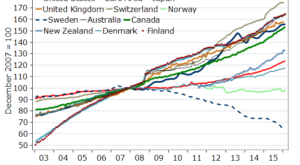US voters have abandoned political correctness. Have they also abandoned decency? They have clearly voted for “change.” Eight years ago, they did the same. They have voted against competence according to common standards. Maybe because they perceived competence to be correlated with “no change.” Maybe because they viewed competence as a weakness. Picking non-competent leaders can pay off in specific bargaining situations. In general, it is unlikely to pay off in the longer term. Race was...
Read More »Leftovers for Grab
Food for All matches restaurants that miscalculated demand with hungry consumers.
Read More »The Demand for Cash
On his blog, J P Koning discusses Kenneth Rogoff’s proposal to abolish high denomination notes (discussed earlier). Koning concludes: I agree with Rogoff’s general point that it makes sense to burden cash users with ever more work since this burden disproportionately falls on heavy users like criminals. But Rogoff hasn’t yet convinced me that the status quo policy of gradually increasing the workload involved in cash usage (via inflation) needs to be sped up by a sudden removal of every...
Read More »Zoroastrianism
In the NZZ, Ulrich von Schwerin reports about the Zoroastrian heritage in Iran. More on Zoroastrianism.
Read More »Salaries of Central Bank Governors
The NZZ compares salaries of central bank governors. Switzerland comes first.
Read More »Wage Penalty for Dialect-Speaking
In a CEPR discussion paper, Jan van Ours and Yuxin Yao conclude that in the Netherlands, for male workers there is a significant wage penalty of dialect-speaking while for female workers there is no significant difference.
Read More »Queen Offers to Restore British Rule Over United States
Andy Borowitz in the New Yorker.
Read More »Zcash
The Economist reports about a new digital currency platform, Zcash. The platform could handle more transactions than for example, Bitcoin. The open-source project backed by outside investors offers confidentiality: Bitcoin obscures the identity of currency owners, but the “blockchain”, the ledger that keeps track of all the coins, is open and can be analysed to see the flows of funds. This is a serious barrier for banks: blockchains could reveal their trading strategies and information...
Read More »The Case Against Democracy
In the New Yorker, Caleb Crain reviews the case. It’s a difficult case to make if most voters are uninformed. Jamming the stub of the Greek word for “knowledge” into the Greek word for “rule,” Estlund coined the word “epistocracy,” meaning “government by the knowledgeable.” It’s an idea that “advocates of democracy, and other enemies of despotism, will want to resist,” he wrote, and he counted himself among the resisters. As a purely philosophical matter, however, he saw only three valid...
Read More »Theories of the Firm
On VoxEU, Kevin Bryan nicely summarizes progress and the lack of it in developing theories of the firm.
Read More » Dirk Niepelt
Dirk Niepelt


